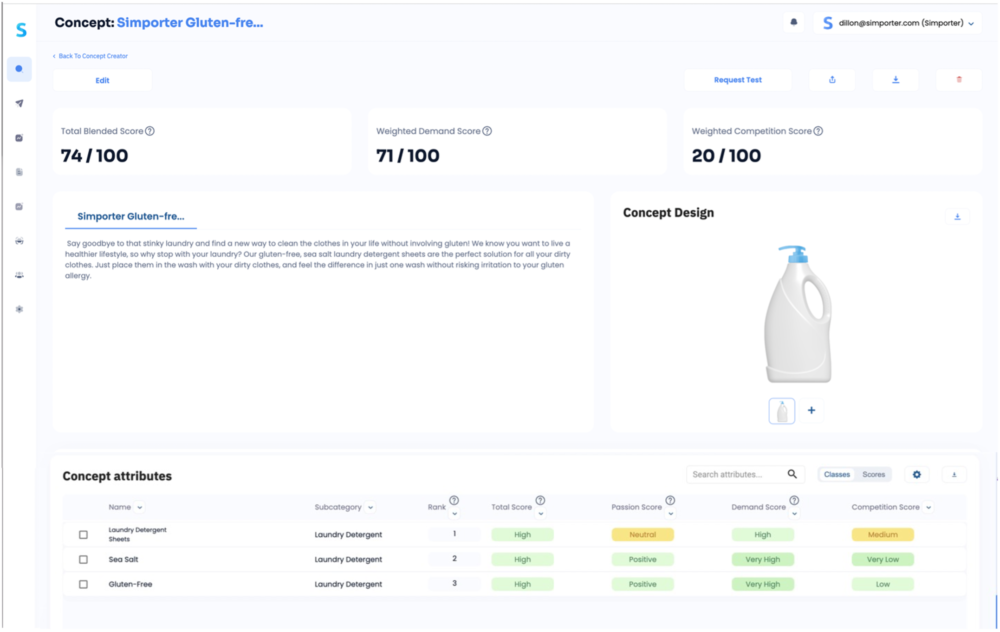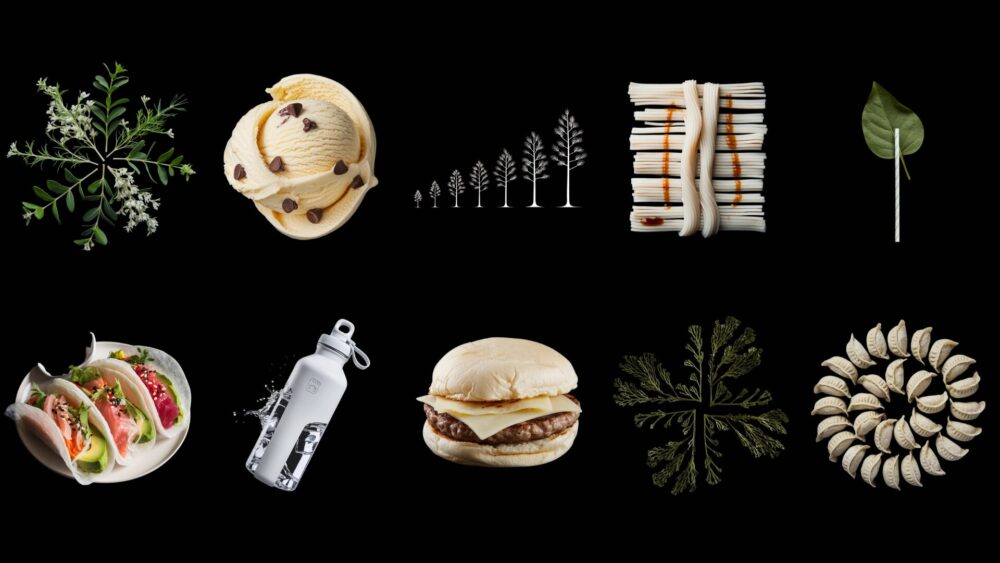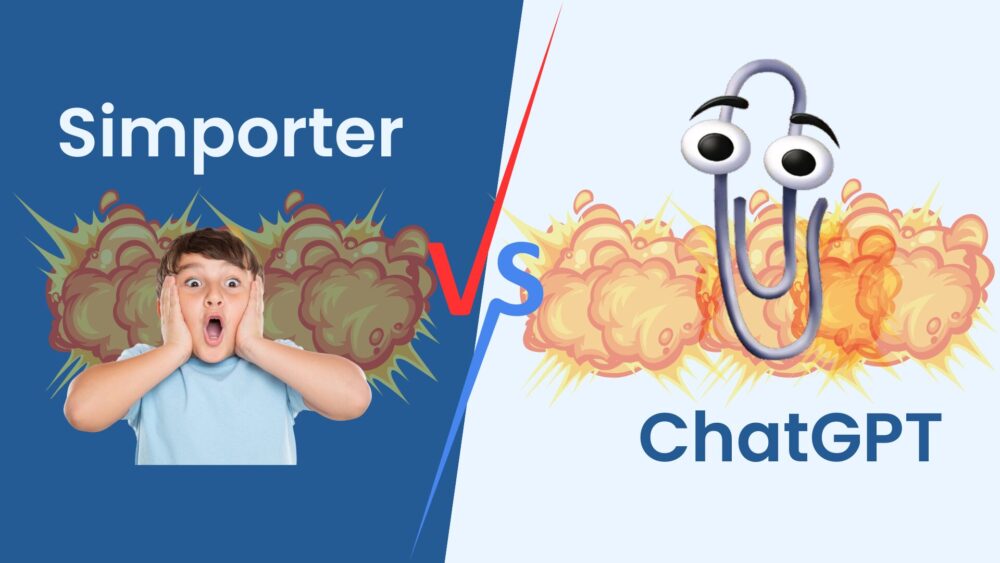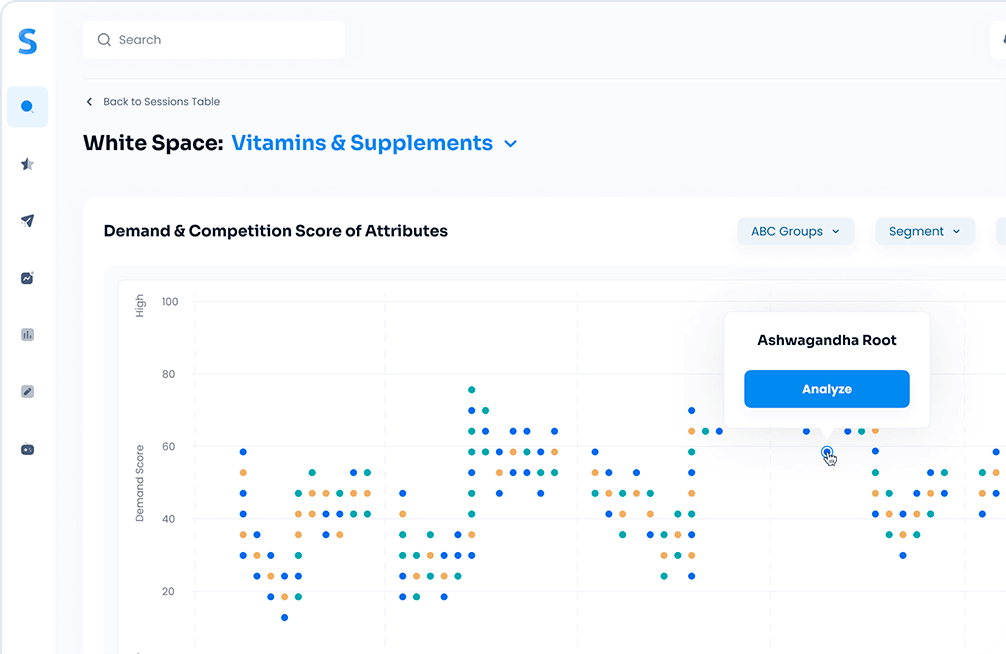This morning, we asked ourselves – how long does it take to make a new product idea using Simporter’s ideation tool? So, we rolled our sleeves up and set a thirty minute timer, from start-to-finish, to put together this article about how we made a new product with Simporter. And the thirty minutes includes this entire write up!
Today, we are going to dive into the Fabric Care category, specifically inside laundry detergents in the United States.
The first thing that we see is our attribute matrix, which plots attributes with their indexed demand prediction as the y-axis and their indexed competition as the x-axis. The Demand Score predicts consumer demand around an attribute by using Artificial Intelligence to forecast the growth in attribute interest based on millions of consumer reviews, search queries, blogs & articles, as well as social media posts.
The higher your demand score, the attribute represents a better opportunity. The Competition Score looks at how often an attribute comes up in product descriptions across different retailers to serve as a parallel to unweighted distribution. The higher your competition score, the worse of an opportunity the attribute is.
We can immediately see three quick insights from our matrix chart for laundry detergent in the United States:
1. Attributes with high competition do not rank below the top 40 percentile for demand in this subcategory;
2. Need States (341 needs) far outnumber Sensory (167) and Ingredient (91) attributes yet have the lowest average competition score.
3. Sensory attributes are the most competitive attribute type. 17 of the 21 attributes with competition scores in the upper 40 percentile are sensory attributes.
Now that we want to identify which attributes to include in our new product idea, we are going to switch to our tool’s table view, which lets us benchmark attributes more clearly against each other.
To establish our new product idea, our best practice is to start by identifying the need states that we want to address. In this example, we’re going to grab the first “a-ha” attribute for us: gluten-free. Gluten allergies usually occur when you consume gluten, not from your clothing. So this is a surprise for us to see in the detergents category – instead of in the snack aisle.
AI Industry 4.0 is a transformational shift from traditional manufacturing practices to smart manufacturing, where machines, devices, and systems are interconnected and communicate with each other to optimize the production process.
However, with gluten-free expected to trend across food and beverage categories, we want to learn how consumer language relates to gluten-free laundry detergent and if it is an attribute that is meaningful to consumer purchasing. So we’ll just quickly pop open our Deep Dive page to capture some sample of consumer reviews.
Here, we see a few examples of strong believers in the gluten-free aspect of detergents:
As well as some people laughing at the idea but still purchasing the product:
We can switch over to the product references tab to see that gluten-free laundry detergents are starting to become a thing with the attribute coming up around products of 27 brands in the category including heavy hitters like Seventh Generation.
We are going to use this attribute in our new detergent and begin to look for a complementary ingredient by going to Simporter’s Related Attributes chart for the gluten-free need state.
The first related ingredient we see is Sea Salt, with very high demand and passion scores, as well as a very low competition score. Let’s use that since it sounds like it could go well with an allergen-free, clean-label product.
A bit lower, we see laundry detergent sheets. That sounds innovative and could stand out on a shelf. Its competition rate is growing pretty quickly but still at a Medium threshold, which often means it is heavy on eCommerce but has not been picked up by the mass market yet. This could represent a great opportunity for our “brand” to move on.
Now that we have the DNA of our product selected, we’re switch over to the Concept Creator and begin to put the product together. We ranked each attribute by its importance in the overall product with the following:
| Attribute | Weight Ranking |
| Laundry Detergent Sheets | Extremely Important |
| Gluten-free | Very Important |
| Sea Salt | Important |
With these weights, we receive a total blended score of 68 / 100. This is above average but not amazing. If we reposition the product to have different weights, we can increase the score by 6% to a 74 / 100, making it a much stronger product by focusing on gluten-free more than its form.
| Attribute | Weight Ranking |
| Laundry Detergent Sheets | Important |
| Gluten-free | Extremely Important |
| Sea Salt | Very Important |
With its primary attribute driving the name, we will call the product Simporter Gluten-free, Sea Salt Laundry Detergent Sheets. Using Simporter’s auto-generated concept description, which turns the attributes you picked into a concept, we’ll just click a button to describe our concept fully. The output from our models is now:
Simporter Gluten-free, Sea Salt Laundry Detergent Sheets
Say goodbye to that stinky laundry and find a new way to clean the clothes in your life! We know you want to live a healthier lifestyle, so why not start with your laundry? Our organic and gluten-free laundry detergent sheets are the perfect solution for all your dirty clothes. Just place them in the wash with your dirty clothes, and feel the difference in just one wash.
We just want to clean up the language to emphasize gluten-free more, so with a few edits, we now have an updated concept description:
Simporter Gluten-free, Sea Salt Laundry Detergent Sheets
Say goodbye to that stinky laundry and find a new way to clean the clothes in your life without involving gluten! We know you want to live a healthier lifestyle, so why stop with your laundry? Our gluten-free, sea salt laundry detergent sheets are the perfect solution for all your dirty clothes. Just place them in the wash with your dirty clothes, and feel the difference in just one wash without risking irritation to your gluten allergy.
Now that the concept is built, we’re just going to make a quick, basic pack stimulus to help visualize our detergent without too much complication. We’ll select a blank pack and, because our 30 minute timer is approaching the buzzer, we will not add a logo our any text onto it.
With 30 seconds left on the clock, here is a quick closer. Gluten-free laundry detergent sheets represent a strong opportunity to be a first mover as a mass-market brand. You can use natural ingredients like sea salt to appeal to gluten-free, health-focused audiences.

Building future innovation ideas is easy with Simporter’s AI tool. We automate new product research so you can easily make better new products that concept test with +20% higher scores on average. If you want to learn more about how you can use Simporter to make better products, faster, sign up for a demo on our website here. Thanks for reading and catch you next time!









